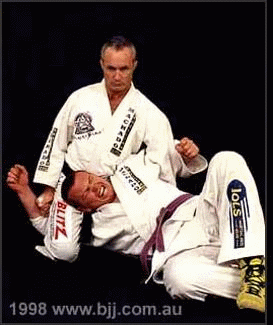
John Will
Black Belt Studios
Geelong, Australia
06/13/05
by R.Navarro
John Will, the main man behind BJJ Australia (the Australasian branch of the Machado Organization),
is known to be one of the first non-Brazilians in the world to receive a blackbelt in BJJ.
As national director for Will-Machado BJJ, he produced an efficient system of training by
creating a syllabus for the Australasian Machado Academies to follow.
The syllabus, in effect, maintained the standard and quality of instruction in the Machado academies all
over Australasia.
Aside from the syllabus, he has to date written four books on the art,
with plans for more in the pipeline. Most of his time now is spent either traveling and holding BJJ Seminars
in martial arts schools or law enforcement and military agencies in Oz, as well as overseas,
or at his academy in Geelong where his passion for teaching and getting 'down to business' remains undiminished.
Welcome to BJJ Philippines.com
Firstly could you tell us about your martial art background and introduction to BJJ?
I began my martial arts training in 1972; with a basic grounding in amateur wrestling, Goju Kai Karate and Taekwondo.
I then left Australian shores in 1975 to study the indigenous martial arts systems of South East Asia;
with many of those years spent in Indonesia learning Pentjak Silat.
Over the next 25 years I took more than 30 overseas training trips; including stints in Thailand, Hong Kong, Japan, India, the U.S.A and Brazil.
In '82, I entered and won gold in the first World Silat Championships held in Jakarta.
Afterward, my friendship with long-time training partner Richard Norton, opened many doors in the Unites States,
that perhaps would have been closed to most people. So in the late 80's,
I began training with such notables as Benny Urquidez, Gene LeBell, Shuki Ron, Pete Cunningham, Rorion and Rickson Gracie
and the Machado brothers.
In the late 80's, a friendship with Rigan Machado allowed me to travel to and train in Brazil.
There, I was exposed to a wide cross-section of Brazil's best BJJ coaches,
and so began a more serious study of Brazilian Jiu Jitsu.
I was finally awarded the rank of Black Belt by Rigan and Jean Jacques Machado in 1998.
Up until that time, I had taught Shootfighting, a street-oriented blend of Groundfighting and Stand-up work;
but upon being graded to Black Belt under the Machado's,
I felt the time was right to promote and develop the Brazilian art here in Australasia.
Hence, BJJ Australia, the Australasian branch of the Machado Organization, was formed.
All the Machado Brothers have achieved enormous success, who would you say has been your biggest influence?
Both Rigan and Jean Jacques had the most influence for me.
Both offered very different and unique views on the practice and development of BJJ.
Rigan is quite simply, a grappling genius.
His approach to the study of grappling is to completely immerse himself in one topic at a time –
and explore it to its furthest conclusion.
Jean Jacques is a master of technical grappling. He uses technique
and high-level strategy to bring him seemingly effortless victories over even experienced world BJJ champions.
He is a phenomenon.
You are one of the true pioneers of the Sport outside of Brazil.
Being the First BJJ Black Belt in Australia and one of the first 12 non Brazilian in the World,
could you tell us about those times and when you first opened a BJJ school in Australia?
I have been teaching the martial arts since the early 80’s.
So my school has been around for more than 25 years. It has just evolved over that time.
I began introducing BJJ elements into our training almost as soon as I began my own study of the art.
It was only after I got my brown belt that I added BJJ-only classes to my program.
As I was the first one in Australia to do so,
it was an interesting time. Students are passionate about whatever their instructor is passionate about.
As my love and understanding of BJJ grew – so did my students.
I have been fortunate to date to have been able to produce some high quality BJJ practitioners and instructors.
The Will – Machado network of schools in Australia is possibly the largest network of BJJ school under the same banner.
Could you tell us about this and how you have been able to achieve such a strong following of loyal students?
We do have the largest single network of schools under the one banner. I have no secrets as to how we have done this.
I have simply remained true to my ideals and goals.
I am uncompromising in my attempts to produce technical and highly educated BJJ instructors.
I care about making people achieve their goals.
In fact, I try to always have people extend themselves and achieve more than what they thought possible.
I love to teach – it is my passion and to some degree – my gift.
I love to break techniques and ideas down to their fundamental components and have other people understand them,
replicate them and ultimately go on to further develop them.
By doing this, we have developed a very strong cadre of exceptional Brazilian Jiu Jitsu instructors,
am proud of all of them.
It is widely accepted and anyone who attends your seminars can testify that you have a limitless knowledge of BJJ and all round martial arts background.
Can you tell us about your teaching methods and seminars?
For me, the art of teaching is a complicated one.
Firstly, one needs to establish a rapport with the student base.
This is different each time, depending on who you are instructing.
If the students are martial artists who have not done groundwork,
the approach has to be quite different from the one taken when teaching experienced grapplers.
The same goes for law enforcement or elite military personnel – you need to be extremely versatile.
Once rapport is established, we need to engage the attention of the individual student on the mat.
That is an art in itself, as different people have different ways in which they learn.
I try to go over the different learning systems – visual, auditory and kinesthetic when I am holding a class.
Then we need to look at how we are structuring the session – it needs to have congruency sown throughout the entire session.
There needs to be structure, and a logical progression from one technique to the next.
The techniques themselves need to be broken down and rebuilt in front of the students’ eyes,
so that those students can participate in the re-engineering of the technique and thereby start to take ownership of it.
Anyway, that’s the tip of the iceberg.
Teaching methodologies are continually evolving. I try to keep on top of it all. A full-time occupation.
The Will - Machado network hold an annual competition in Australia.
Could you tell us about this and your guest instructors?
Our annual competition is for our members and instructors only.
The reason for this is to maintain the close-knit family atmosphere that is central to the culture I have tried to establish.
Bad language and offensive behavior is not tolerated like it is in so many other open tournaments.
It is a chance to see our members get together and not only compete, but swap ideas and techniques.
This simply doesn’t happen in open comps. It is a lot of fun and getting bigger every year.
I am trying to bring out Rigan Machado again this year – a special treat for everyone who comes along from interstate and overseas.
The Kamphuis- Machado School is hosting the second open BJJ comp held in the Philippines.
What are your thoughts about this?
I think that Stephen is doing a wonderful job in the ‘Pines.
He is a great ambassador for Will-Machado BJJ and I know that his efforts will really pay off in time.
The tournament is a testament to his organizational skills as well.
Congratulations Steve!
All Will-Machado schools including Kamphuis – Machado follow the syllabus as devised by yourself for Grading purposes.
Could you tell us more about this and the concept behind this method of grading?
Having a structured syllabus is key to having a consistent knowledge-base throughout our organization.
Having this syllabus, which has been well thought out over many years,
allows me to rest assure that students are receiving the highest quality information no matter where they are training.
We are all building on the same foundation and as long as the syllabus is followed,
I know that the instructors’ knowledge base is extraordinarily deep.
The last thing a student needs is an instructor who is a great competitor,
has achieved this by developing one or two favorite moves,
and is trying to teach every one of his students to play his own personal game.
Students need to have a broad and deep foundation before narrowing their focus to a particular game.
Look at Judo for instance; Jigoro Kano developed the Judo Kata for exactly the same reason.
So the idea is not a new one!
I know Stephen is a keen follower of imparting the syllabus structure into the students training and knowledge base.
An hour is set aside each week solely for this purpose.
As an instructor what are areas do you see that new students need to concentrate the most before they start attempting the more complex moves?
New students need to focus on developing competency and a good understanding of the basic blue belt syllabus.
This should be their focus before anything else.
One needs to learn how all the men move before one begins to play a chess game.
The worst thing to do is to start wrestling straight away.
We need to do a little study first.
Then we can start to put things to the test.
What is your opinion of politics in sport?
Politics is an inevitable part of life. On a personal level,
- I try to ignore it all and get on with living my life and teaching my students as best I can.
Life is too short to be worried about political battles and posturing.
I love the martial arts and I love teaching the martial arts;
I don’t want to be distracted from this by letting my energies be consumed in Machiavellian pursuits.
What do you think of cross training between BJJ schools?
I think that cross training between schools can be rewarding.
It all comes down to the instructor – if two instructors get along,
then they set the culture for all of their students to follow.
But you have to get two instructors who are ‘on the same page’ – sometimes hard to do!
We are very much looking forward to the time when we can host one of your seminars in the Philippines.
Would you have the time to visit us sometime in the future.
Absolutely. I would love to come over.
I have been in the Philippines once before when a friend of mine was married there some years back.
I love the people and the great Filipino food! I am so proud of the great work done by Steve –
and would love the chance to see the great family he is creating there.
Thank you for taking the time to answer our questions. It is our pleasure that you share some of your insight, background and knowledge with our members and students of Kamphuis – Machado School and bjjphilippines.com

BLACKBELT INTERVIEWS
Anthony Perosh, SPMA - 01/23/06
John Will, Will-Machado Academy - 06/13/05
Anthony Lange, Northside Martial Arts - 05/02/05








